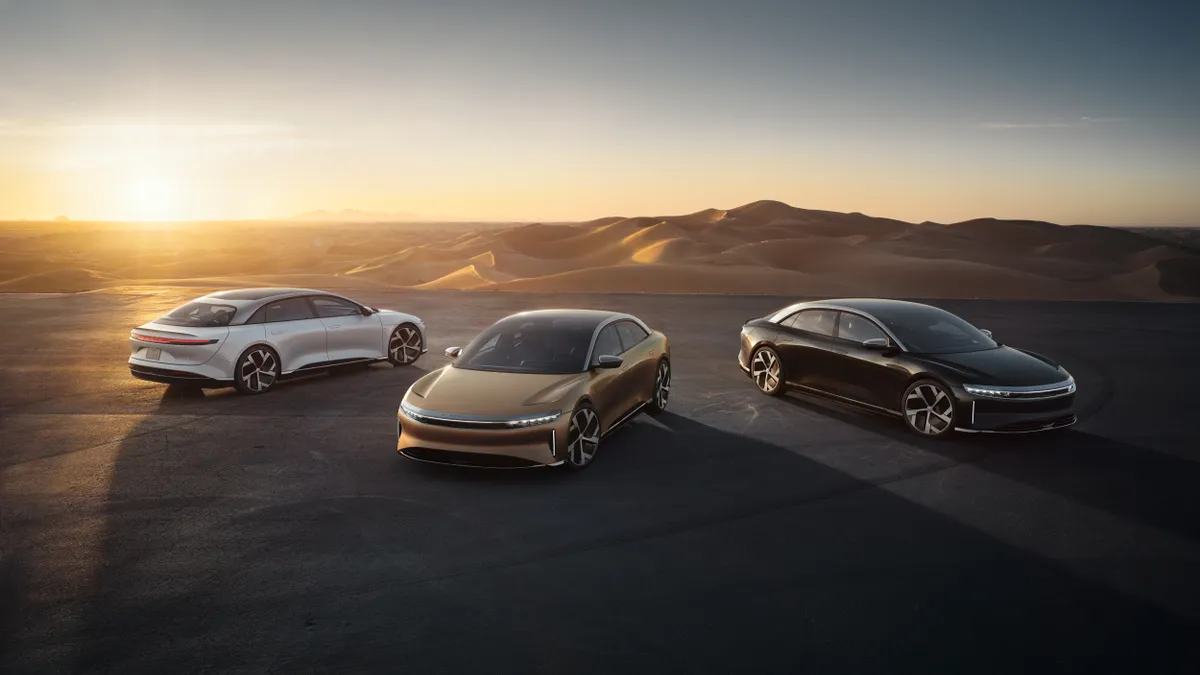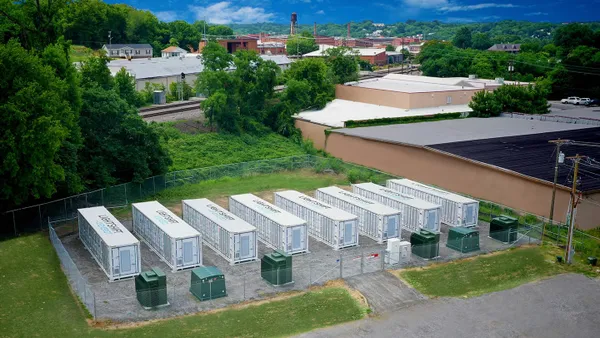Dive Brief:
- Lucid Motors, which unveiled its luxury electric sedan, the Lucid Air, on Wednesday, is developing home energy storage systems as well as utility-scale energy storage, CEO Peter Rawlinson said in a recent interview with Bloomberg Quint.
- Lucid Motors began its life as Atieva, a battery maker, so it's uniquely positioned among other EV manufacturers to join Tesla in offering energy storage systems, according to Sam Abuelsamid, principal e-mobility analyst for Guidehouse Insights.
- Clean energy advocates say alignment between to auto industry and battery makers could lead to more options for residential energy storage. Natural Resources Defense Council attorney Miles Muller said expanding access to home battery systems can help states meet clean energy goals.
Dive Insight:
In addition to offering home energy storage systems, Lucid's Air sedan will have bi-directional energy flow capabilities, allowing homeowners to power their residences from the car's battery pack, according to the company's marketing materials.
Muller pointed out that Lucid is following Tesla's strategy in offering both EVs and energy storage. "Overall, it's great that another EV manufacturer sees value in offering home storage solutions and is working to expand options for people who are interested," Muller said, "It gives states another tool in the toolbox for working to achieve their climate goals and promoting reliability."
While most other EV manufacturers are unlikely to pursue the energy storage market, Abuelsamid explained, stationery storage offers a "second life" use for EV battery packs when a vehicle reaches its end of life or the battery pack capacity has declined to the point where it's no longer useful for powering a vehicle.
For example, the design of General Motors' Ultium battery pack integrates battery management into each component module rather than at the battery pack level, according to Abuelsamid. During the vehicle's operating life, modules can be swapped out for the company's current module and the battery management software can balance the replacement module with others in the battery pack. At the end of the vehicle's life, modules can be mixed and matched in a stationary energy storage system.
The Lucid Air is one of the first cars built to support bidirectional charging, allowing owners to draw energy for their homes from the car battery pack, Abuelsamid said. Now that Lucid has decided to offer stationary storage, it makes sense for the company to offer a range of systems, including utility-scale and storage for commercial and industrial applications. Nissan Leaf owners in Japan can use the bidirectional charging capabilities of their cars for home energy storage through a home fast-charging system not yet offered in North America.
With approximately 500 miles of range, Lucid Air owners will need to use public charging stations less frequently, perhaps only during extended road trips, Abuelsamid said. However, owners are likely to prefer DC fast charging over AC charging, due to the large 113 kWh battery. The Lucid Air supports 350 kWh fast charging, allowing owners to add 300 miles of battery capacity from 20 minutes of charging.
Abuelsamid pointed out the Lucid Air is a premium luxury car — the Dream Edition of Lucid Air will sell for $170,000 and an $80,000 model is unlikely to become available until 2022. More mainstream vehicles are unlikely to come equipped with a 113 kWh battery due to costs and battery bulk.
However, Lucid's innovations could have applications for more mainstream vehicles, Abuelsamid said. Lucid has put an emphasis on overall energy efficiency within the battery and propulsion systems, giving them the maximum number of miles from every kWh. The technology could be valuable in lower-price vehicles with smaller battery packs, reducing the load on the public-charging infrastructure.
Abuelsamid expects to see more carmakers offer vehicles capable of bidirectional charging now. He also expects to see cooperative marketing arrangements develop between electric vehicle makers and energy storage vendors, possibly leading to electric vehicle, home energy storage and rooftop solar bundles.














